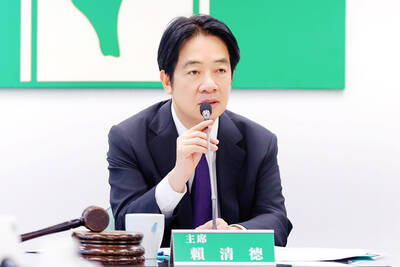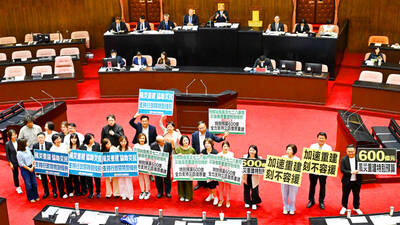Europe’s largest oil company, Royal Dutch Shell PLC, reported a 57 percent increase in net profit for the first quarter yesterday, crediting higher oil prices, production growth and cost-cutting.
Net profit was US$5.48 billion, up from US$3.49 billion in the same period a year ago.
Revenues were US$86 billion from US$52.2 billion.
Notably, oil production increased 6 percent from the first quarter of last year to 3.59 million barrels of oil per day.
“So far in 2010, oil prices have remained firm and demand for petrochemicals has increased, but refining margins, oil products demand and spot gas prices all remain under pressure,” chief executive Peter Voser said in a statement. “Although there are signs of an improving economic outlook, we are not relying on it, we are continuing with our focus on cash flow growth, underpinned by new project startups and lower costs.”
Shell has invested heavily in new capacity throughout the downturn after an accounting scandal in 2004 forced it to slash proven reserves. Production has been declining for nearly a decade, but the company expects it to rise more than 10 percent by 2012.
A new project came on line in the Gulf of Mexico this quarter and is producing 100,000 barrels per day, while other recent projects on Russia’s Sakhalin island and Parque das Conchas in Brazil are now producing 120,00 barrels per day.
Shell said production earnings were somewhat hurt by natural gas prices lagging oil prices — a little more than half of Shell’s total production is in the form of gas.
Refining earnings rose 11 percent to US$1.33 billion. The division performed far better than the fourth quarter of last year, when it posted a US$1.76 billion loss.
Shell is planning to sell 15 percent of its refining operations to reduce exposure to the business.

President William Lai (賴清德) yesterday criticized the nuclear energy referendum scheduled for Saturday next week, saying that holding the plebiscite before the government can conduct safety evaluations is a denial of the public’s right to make informed decisions. Lai, who is also the chairman of the Democratic Progressive Party (DPP), made the comments at the party’s Central Standing Committee meeting at its headquarters in Taipei. ‘NO’ “I will go to the ballot box on Saturday next week to cast a ‘no’ vote, as we all should do,” he said as he called on the public to reject the proposition to reactivate the decommissioned

In his National Day Rally speech on Sunday, Singaporean Prime Minister Lawrence Wong (黃循財) quoted the Taiwanese song One Small Umbrella (一支小雨傘) to describe his nation’s situation. Wong’s use of such a song shows Singapore’s familiarity with Taiwan’s culture and is a perfect reflection of exchanges between the two nations, Representative to Singapore Tung Chen-yuan (童振源) said yesterday in a post on Facebook. Wong quoted the song, saying: “As the rain gets heavier, I will take care of you, and you,” in Mandarin, using it as a metaphor for Singaporeans coming together to face challenges. Other Singaporean politicians have also used Taiwanese songs

US President Donald Trump on Friday said that Chinese President Xi Jinping (習近平) told him China would not invade Taiwan while Trump is in office. Trump made the remarks in an interview with Fox News, ahead of talks with Russian President Vladimir Putin over Moscow’s invasion of Ukraine. “I will tell you, you know, you have a very similar thing with President Xi of China and Taiwan, but I don’t believe there’s any way it’s going to happen as long as I’m here. We’ll see,” Trump said during an interview on Fox News’ Special Report. “He told me: ‘I will never do

The Legislative Yuan yesterday approved an aid and recovery package authorizing the government to allocate up to NT$60 billion (US$1.99 billion) for regions hit by Typhoon Danas and subsequent torrential rains last month. Proposed by the Executive Yuan on Aug. 7, the bill was passed swiftly after ruling and opposition lawmakers reached a consensus in inter-party talks on relief funding and assistance for disaster-stricken areas. The package increases the government’s spending cap from the originally proposed NT$56 billion to NT$60 billion, earmarked for repairing and rebuilding infrastructure, electricity systems, telecommunications and cable TV networks, cultural heritage sites and other public facilities.